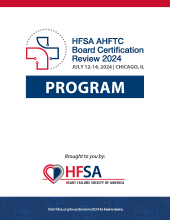
The in-person HFSA AHFTC Board Certification Review 2024 will take place July 12-14, 2024. The educational content is rigorous, up-to-date, scientifically fair, and balanced, and meets the needs of heart failure providers who care for patients with heart failure. Join us in Chicago for this comprehensive course, designed to assist you in preparing for the ABIM Advanced Heart Failure and Transplant Cardiology Board Certification and Maintenance of Certification Exams. See full agenda here.
Download the Program >>
The 2024 HFSA AHFTC Board Certification Review is designed for physicians who are preparing to take the ABIM Advanced Heart Failure and Transplant Cardiology Certification Examination or the Maintenance of Certification Assessment Examination, or heart failure specialists seeking an in-depth review in heart failure.
For the Certification Examination in Advanced Heart Failure and Transplant Cardiology:
This course is designed to:
- Review testable content and the focus of the ABIM Advanced Heart Failure and Transplant Cardiology Certification Examination.
- Identify gaps in knowledge about advanced heart failure and transplant cardiology.
- Explain how to best focus study efforts on filling identified knowledge gaps.
- Provide practice for the certification examination with ABIM-style multiple-choice test questions.
For Clinical Practice:
- Describe the epidemiology of heart failure, including environmental factors, and implement strategies for the prevention of heart failure.
- Discuss the pathophysiology of heart failure, including normal physiology and compensatory and maladaptive mechanisms.
- Assess and treat patients with acute or advanced heart failure, using non-invasive and invasive tests and biomarkers.
- Apply guideline-based therapy for patients with chronic heart failure, including pharmacologic agents; non-pharmacologic options, such as diet and exercise; and implantable devices.
- Incorporate appropriate care strategies for patients undergoing chemotherapy or with pulmonary hypertension, heart failure with preserved ejection fraction, valvular heart disease, pregnancy-associated disease, and cardiorenal syndrome.
- Manage comorbidities in patients with chronic heart failure, including sleep-disordered breathing, anemia, and diabetes.
- Implement strategies for effective disease management of patients with advanced heart failure, including referral for mechanical circulatory support, heart transplant, or palliative care.
- Manage immunosuppressive therapies and common complications of heart transplant, including rejection, allograft vasculopathy, and immunosuppression-associated conditions.
- Utilize mechanical support devices, both temporary and durable.
- Manage common complications of mechanical circulatory support.

